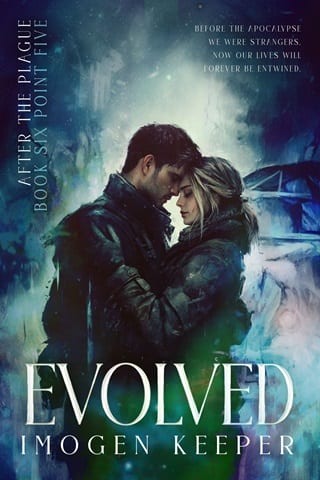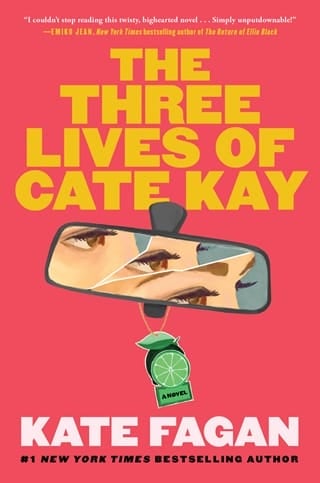12| Our lucky day
12| Our lucky day
OTTILIE
W E ENTER at the Rayburn building, but instead of going left, we turn right. That tunnel runs alongside a metro line, and for a while, we can even see the tracks through columns and gaps between the walls, but eventually, they separate, and we enter a different tunnel.
This one feels older.
Or maybe just more rudimentary, like walking down the inside of a massive pipe paved in bricks.
And it isn't flooded, but judging by the water glistening in puddles and the thirty-or-forty-inch damp-line in the brick walls, it was recently.
As we get closer to the Potomac River, the temperature lowers, and the sound of droplets echoes endlessly. Emergency lights sit in cages at intervals along the ceiling, but they must have been controlled by generators that have long since run out of gas.
Eventually, we hit a staircase that leads us down even deeper, and here there really is standing water, and the temperature gets colder again.
"Have you been here?" I ask Knox, my breath forming a fog that swirls in the light like ghosts.
"Not this one. But there's an evacuation tunnel that goes under the river. This may connect to it somewhere." He points his beam vaguely in the direction I think is probably north.
We don't speak again until we get to a door which Knox pries open using his crowbar.
"You ready?" he asks.
"No."
"Me neither."
I turn off the flashlight, just in case, plunging us into darkness as he opens the door.
There'd a scrape that echoes colossally.
"Turn it on again," he whispers.
I do gladly, chasing away the horror void to reveal an underground galley. The ceiling is twenty or thirty feet up, and the room is filled with office chairs and desks that look like they haven't been used since the 1960s.
Knox closes the tunnel door behind us and takes my hand carefully in his, leading me from that door to another.
This one leads to a stairwell, a tight spiral stairwell, grated metal steps, concrete walls, emergency lights gone dark, and an unlit exit sign pointing upward.
"It's like leaving one circle of hell for another," I whisper.
He tucks my hand into his waistband, tugs out a second flashlight, and up we go.
One flight.
Two.
Five.
Ten?
It feels endless.
So many flights I start to think we've come to the wrong place. This can't be the White House.
By the end, even Knox is breathing heavily.
At the top, we hit another door, and this one is made of wood, a heavy door, old and paneled and painted with a big brass handle, and a strip of soft light reveals itself along the edges when we turn our flashlights off and stow them in Knox's backpack.
Noise hits my ears first.
Laughter.
A woman speaking.
Applause?
It sounds like an award ceremony or a gala.
Trading a wary glance with Knox, I carefully turn the handle.
The door's hinge squeaks quietly, and we step out into the empty main hall.
I know this door.
I know this floor.
This is the Cross Hall, just off the main entrance.
Light, as if from a hundred candles, pours across the polished taupe-and-ivory checkerboard floors from the direction of the State Dining Room.
The smell of food hits my nose. Nothing elaborate. More macaroni than filet minion, but it's still palpable, thick in the air, as is the sound of a woman's voice, projected loudly enough as if she were addressing a crowd.
"We're free of all the things that held us back in the past—greed and bureaucracy, hate and division, oversight, red tape and even speeding tickets—it's all gone."
She pauses perfectly.
And I know those words.
I wrote those words.
But I didn't write them for whoever is saying them.
The voice isn't Gran's.
"This is my speech," I whisper.
Knox's hand touches low on my belly, pushing me slightly behind him. "Come on."
We slide into motion together, both of us with our guns drawn. It happens seamlessly; he angles his body to his right, and I angle mine left as we move along the outside walls toward the light and the sound coming from the State Dining Room.
The sound is clearer now.
The voice rises up, louder now as the applause dies back.
"But that freedom came a terrible price. And we cannot waste it. We must honor the dead by building a better, brighter future," the voice continues.
There's another swell of applause.
Applause echoes off the walls.
Closer now, Knox and I press our backs to the wall outside the massive double doors and peek inward.
Candles cover surfaces, glinting off the mantle and across the massive mahogany banquet table.
People fill the room—more than I expected, more than the Mustache Man could have had alone. They're dressed in a wide assortment of attire—some in jeans and flannel, some in sweats, others in leather jackets, still others in button-downs or knit sweaters.
I find Gran—a relieved breath rushing out of me—she's wearing one of the sweater and trouser sets I got from the boutique with Knox.
She's facing partly away from me, watching as the woman standing at the center of the room, with glossy red hair, dressed in trim black ankle-length slacks and a button down, a set of black pearls around her throat.
She looks healthy, fiery, substantial.
Lavinia Hope.
"Give me your trust," she says earnestly, her frosty gaze trickling across the room, from person to person, and then finding Knox and me just barely in the doorway. She locks eyes with the Mustache Man himself, standing a few feet away like a personal guard, and tips her head.
He follows her line of sight.
Before he can move toward us, Knox and I holster our guns, walk into the candlelit room, lift our hands up so they can see we're no threat.
She nods, a self-satisfied, almost amused look crossing her features. "Give me your trust," she repeats, as if she never broke her stride, continuing with an altered version of one of my speeches, "and in a month, we'll have the city cleared of the dead; we'll put them to rest. In two, we'll have water filtration and limited power. In a year, we'll have farms, and life will be recognizable again. We will learn from our past, and we will build beautiful, vibrant futures for ourselves. Together."
Applause flutters around the room as we walk slowly through it.
People part for us until we're standing on either side of Gran.
"Oh, good," she says when she sees us. "I was hoping you'd come." A glance from me to Knox and back, seeing everything, missing nothing. "I see you've made a tentative peace." She projects her voice loudly enough I'm sure everyone inside ten feet heard it.
She knows it's a lie, but she gives nothing away.
"I don't agree with his methods," I say sullenly.
Knox looks away irritably.
"As long as you tolerate one another, we will be fine," Gran adds easily.
"We have had four new members join us," Lavinia Hope's voice cuts through my thoughts. "A politician," she points at Gran. "A doctor." She points at a thin man wearing spectacles. Something about the set of his nose has chill rippling up my spine. "A Secret Service Agent and a political advisor." She Cheshire-grins. "We were so hoping you would just. It is, indeed, our lucky day. Please welcome them with a round of applause."
Polite smatterings of clapping echo in the room as curious eyes take us in.
"Now, let us enjoy the meal," Lavinia says, her glittering blue eyes flickering avidly between me and Knox.
All around, people's voices rise up in conversations, though I can feel them still watching us.
I lean down to whisper in Gran's ear, "Why give her my words?"
"I took your advice, Ottilie. You didn't think that after a catastrophe, facing the unknown, people would want an elderly sick woman in charge. So I'm giving them a youthful, energetic fighter, fresh out of the Big War." Gran clicks her tongue off her teeth, taking in my undoubtedly dismayed expression. "You always wanted me to run a normal campaign— well, here we go. Your dream came true. I am Vice President again. I even have dialysis here. And in a few years, I can run again."
"You trust her?" I ask.
Gran smiles. "The better question is does she trust me?"
Turn the page for details about the next exciting installment of the world After the Plague and more!
 Fullepub
Fullepub 



